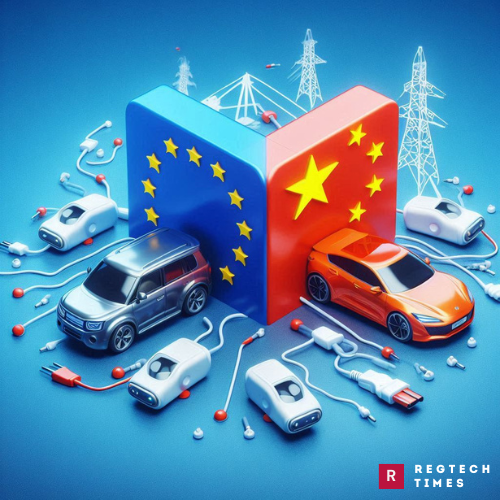The European Union has imposed provisional tariffs of up to 38% on Chinese electric vehicle (EV) imports, citing unfair state subsidies that are undercutting European manufacturers. The decision, announced on Thursday, has sparked a significant debate within Europe and raised concerns about a potential trade war with China.
Protecting European Automakers
The European Commission’s investigation, initiated last year, concluded that Chinese state subsidies for EV manufacturers gave them an unfair advantage over their European counterparts. The EU’s trade chief, Valdis Dombrovskis, stated that the subsidies posed a threat to the economic viability of the EU’s own electric car makers, who are in the midst of transitioning from thermal to electric power.
Effective immediately, the EU has set provisional duties: 17.4% for BYD, 19.9% for Geely, and up to 37.6% for SAIC. Tesla, manufacturing in China, has requested a specific tariff rate based on its submitted evidence. Companies that cooperated with the EU investigation face an average duty of 20.8%, while non-cooperators confront the maximum 37.6% tariff.
US-China Price War: The High Stakes Battle for AI Dominance
Mixed Reactions in Europe
The move has elicited mixed reactions across Europe. The Chinese Chamber of Commerce to the EU condemned the tariffs as politically motivated and protectionist, expressing hope for a resolution through dialogue. European nations themselves are divided: Germany, home to major auto manufacturers like Volkswagen and BMW, has expressed strong reservations. German automakers fear that the tariffs could provoke Chinese retaliation, harming their exports and business interests in China.
Volkswagen criticized the tariffs as “detrimental,” while BMW’s CEO warned that the tariff battle could lead to a “dead end.” Germany’s Vice Chancellor, Robert Habeck, visited Beijing recently in a last-minute effort to prevent a damaging trade war.
Bold but Controversial: China’s Stealth Entry into US EV Market via Morocco
Conversely, France and Italy have supported the tariffs, arguing that they are necessary to protect European manufacturers from unfair competition. Sweden has expressed reservations similar to Germany’s, while Hungary is outright opposed to the tariffs.
Potential Retaliation from China
China has signaled its readiness to retaliate against the EU’s tariffs. Last month, Beijing launched an anti-dumping probe into pork imports, threatening Spanish exports. Chinese media have suggested that further probes could target other sectors, including high-value goods like French wine, cognac, and agricultural products, as well as airliners from Airbus Industries.
Despite the tariffs, the EU remains open to negotiations with China. Dombrovskis emphasized that the EU continues to engage intensively with Chinese officials to find a mutually acceptable solution. Should a negotiated outcome address the EU’s concerns and comply with WTO rules, the tariffs may not be fully implemented.
Sanctions Clash: US Lawmakers Push to Ban Chinese Battery Giants Linked to Uyghur Forced Labor
Economic and Environmental Implications
The EU’s decision comes at a critical juncture as Europe aims to transition to electric vehicles. The EU plans to ban the sale of new fossil fuel-powered cars by 2035, with an intermediate target of over 20% EV sales this year, rising to about 80% by 2030. However, EV sales in Europe have plateaued at around two million units this year, with forecasts projecting only seven to eight million by 2030—significantly short of the required 80%.
Chinese EVs have rapidly gained market share in Europe, climbing from around 3% to over 20% in the past three years, according to the European Automobile Manufacturers’ Association. Chinese brands account for about 8% of that share. Analysts warn that curbing Chinese EV imports could hinder the EU’s ambitious EV targets.
EV Tariffs Loom : German Automakers Fear 25% Chinese Retaliation
Market Dynamics and Future Prospects
Chinese automakers have developed significant cost advantages through vertical integration and control over key components like batteries. BYD, for example, has been selling its EVs in Europe at double or nearly triple the price in China, yet still remains competitive. Investment bank UBS notes that Chinese manufacturers like BYD enjoy a 30% cost advantage over their European counterparts.
Despite the tariffs, analysts predict that Chinese EVs will continue to grow in the European market, particularly in the economy segment. European brands currently lack the efficiencies and lower cost structures of Chinese manufacturers, delaying the launch of entry-level EVs and giving Chinese brands a clear market advantage.
As the EU navigates this complex trade landscape, it faces the challenge of balancing the protection of its auto industry with the need to avoid a damaging trade war and meet its environmental goals.


